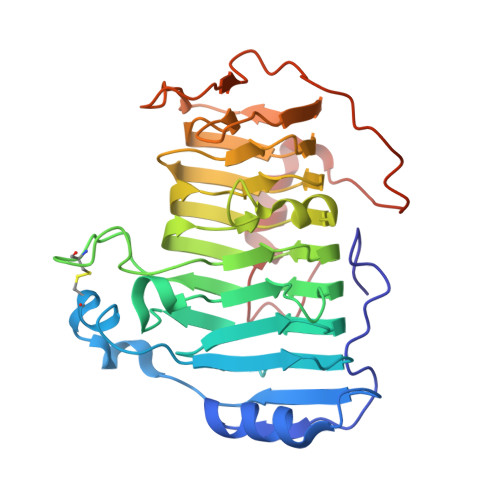Improvement of the thermostability and activity of a pectate lyase by single amino acid substitutions, using a strategy based on melting-temperature-guided sequence alignment.
Xiao, Z., Bergeron, H., Grosse, S., Beauchemin, M., Garron, M.L., Shaya, D., Sulea, T., Cygler, M., Lau, P.C.(2008) Appl Environ Microbiol 74: 1183-1189
- PubMed: 18156340
- DOI: https://doi.org/10.1128/AEM.02220-07
- Primary Citation of Related Structures:
2QXZ, 2QY1 - PubMed Abstract:
In the vast number of random mutagenesis experiments that have targeted protein thermostability, single amino acid substitutions that increase the apparent melting temperature (Tm) of the enzyme more than 1 to 2 degrees C are rare and often require the creation of a large library of mutated genes. Here we present a case where a single beneficial mutation (R236F) of a hemp fiber-processing pectate lyase of Xanthomonas campestris origin (PL(Xc)) produced a 6 degrees C increase in Tm and a 23-fold increase in the half-life at 45 degrees C without compromising the enzyme's catalytic efficiency. This success was based on a variation of sequence alignment strategy where a mesophilic amino acid sequence is matched with the sequences of its thermophilic counterparts that have established Tm values. Altogether, two-thirds of the nine targeted single amino acid substitutions were found to have effects either on the thermostability or on the catalytic activity of the enzyme, evidence of a high success rate of mutation without the creation of a large gene library and subsequent screening of clones. Combination of R236F with another beneficial mutation (A31G) resulted in at least a twofold increase in specific activity while preserving the improved Tm value. To understand the structural basis for the increased thermal stability or activity, the variant R236F and A31G R236F proteins and wild-type PL(Xc) were purified and crystallized. By structure analysis and computational methods, hydrophobic desolvation was found to be the driving force for the increased stability with R236F.
- Biotechnology Research Institute, National Research Council Canada, 6100 Royalmount Avenue, Montreal, Quebec H4P 2R2, Canada.
Organizational Affiliation:

















